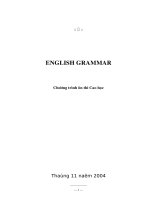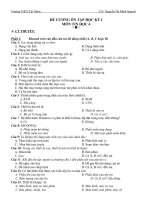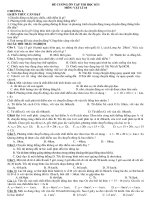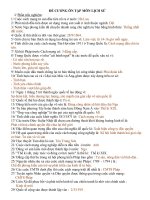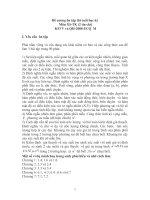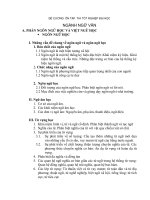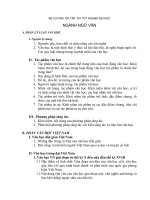Đề cương ôn tập thi Cao học
Bạn đang xem bản rút gọn của tài liệu. Xem và tải ngay bản đầy đủ của tài liệu tại đây (202.98 KB, 56 trang )
ENGLISH GRAMMAR
Chöông trình oân thi Cao hoïc
Thaùng 11 naêm 2004
__________
--- 1 ---
UNIT 1
PRESENT SIMPLE and PRESENT CONTINUOUS
I. THE PRESENT SIMPLE :
The Present Simple is used to talk about :
- Actions done regularly or frequently, often wih adverbs like never,
seldom, occasionally, sometimes, often, usually and always
EX : * David usually plays football on saturday
* Mary doesn’t go to school by bus
* What do you do in the evenings ?
- Facts that are always or usually true
EX : * She comes from Cairo
* Elephants don’t eat meat
* Does it often rain much in September ?
II. THE PRESENT CONTINUOUS :
The Present Continuous is used to talk about things that are happening
now, at the moment of speaking, often with adverbs like now, at the moment,
at present, today, this week, etc
EX : * Elena is writing a letter at the moment
* They are playing football in the yard now
III. NOTE :
The verbs following are not used in the present continuous :
Believe, belong, contain, dislike, doubt, hate, impress, know, like, love,
mean, need, owe, own, prefer, resemble, seem, suppose, surprise, understand,
want, wish
There seems to be = It seems that there is
IV. EXERCISES :
A. Complete the sentences, using the Present Simple or the Present
Continuous :
1. He always ______ chocolate after lunch ( eat )
2. I can’t come. I ______ my mother ( help )
3. They ______ hard enough at present ( not / study )
4. They often ______ coffee in the evenings ( drink )
5. Clara occasionally ______ to the theater ( go )
6. Yukiko ______ a bath now ( have )
7. We ______ a cake at the moment ( make )
8. I never ______ cigarettes ( smoke )
9. She ______ her hair twice a week ( wash )
10. Lisa ______ her sister’s car today ( drive )
--- 2 ---
11. The Amazon ______ into the Atlantic ( flow )
12. Many birds ______ south for the winter ( fly )
B. Write full sentences using the information given :
1. You / speak / Greek ?
2. Bill / know / Mr. Jameson ?
3. We / not live / in a large house
4. Alexandre / not go / to the beach very often
5. I / have to / attend the ceremony ?
6. Jane / watch / television at the moment ?
7. Costas / not work / in a bank
8. The children / not listen / to their mother now
9. Theo / live / in new York ?
10.William / study / at the moment ?
11.Where / you / usually spend / your holidays ?
12. I / not earn much money at present
__________
--- 3 ---
UNIT 2
PAST SIMPLE and PRESENT PERFECT
( Simple and Continuous )
I. THE PAST SIMPLE :
The Past Simple is used to talk about completed actions at a particular
point in the past, often with dates or times and words like yesterday, formerly,
last and ago
EX : * Kurt went to Canada in 1998
* I didn’t see you yesterday
* Did you live in California formerly ?
* Where were you last weekend ?
II. THE PRESENT PERFECT :
The Present Perfect is used to talk about :
- Recent actions or events when no fixed time is given ( e.g. news,
reports ), often with words ike just, recently, and lately
EX : * A volcano has erupted in Japan
* I’ve just seen your mother in the street
- Actions with have a result in the present
EX : * What’s wrong ? Have you lost your keys ?
- Actions in a period of time which is not yet finished, and experiences
in someone’s life so far, often with yet, so far, ever, for, and since
EX : * I haven’t had any letters this week
* She’s visited New York five times in her life so far
* Have you ever been to Greece ?
III. THE PRESENT PERFECT CONTINUOUS :
The Present Perfect Continuous is used to talk about actions which
started in the past and are still happening, or which have recently stopped but
have a result in the present
EX : * I’ve been waiting here for ten minutes
* Your eyes are red. You haven’t been crying, have you ?
IV. EXERCISES :
A. Complete the sentences, using the Past Simple, the Present
Perfect or the Present Perfect Continuous, and the words in brackets
1. Rafael ______ shopping for me yesterday ( go )
2. Sandra ______ her brother £200 so far ( lend )
3. The policeman ______ ten minutes ago ( drive away )
4. The biscuit factory ______ last year ( close down )
5. She’s very red. I think she ______ in the sun ( lie )
--- 4 ---
6. Raschid ______ his driving test ( just / pass )
7. Karen _____ Italian for three years now and is still studying ( study )
8. The headmaster ______ to the school in 1985 ( come )
9. Jack _____ to get a job for six months, but is still unemployed ( try )
10. The teacher ______ him to be quiet ( already / tell )
11.Tim ______ many photos yet ( not / take )
12. Oh no ! I ______ my purse at home ( leave )
13. They ______ in love with each other at first sight ( fall )
14. I don’t want a bath, thanks. I ______ a shower ( just / have )
15. I’m sorry, I ______ your name. What did you say it was ? ( forget )
B. Write full sentences using the information given
1. When / you / last go / to Spain ?
2. You / ever speak / to a film star ?
3. You / spend / a lot of money last month ?
4. I / not say / anything up to now
5. Laura / not have / a holiday so far this year
6. You / see / any good films lately ?
7. You / ever / be / to Japan ?
8. Helmut / write / to you yet ?
9. The boys / finish / their homework yesterday ?
10.Rolf / not buy / the leather jacket last week
C. Complete the sentences with for ot since
1. I haven’t seen him ______ ages
2. Maria hasn’t played tennis ______ last summer
3. Bob and I have been friends ______ years
4. ______ his birthday, Peter has been behaving rather strangely
5. Mr Brown worked in New York ______ ten weeks
6. They waited outside the cinema ______ half an hour
7. Peter has been in the country ______ January 27
th
1990
8. We lived in Paris ______ a long time before moving to Brussels
9. I’ve been waiting for the doctor ______ 4.30
10. I’m sorry I haven’t written ______ so long
D. Complete the passage using the correct tense of the verbs in
brackets :
Good evening. This is the nine o’clock news. At least three people
______ ( die ) in a serious accident on a narrow road in the north-west
Highlands. A minibus carrying eight businessmen ______ ( crash ) into a
tourist coach just after 11 o’clock this morning
--- 5 ---
There ______ ( be ) thick fog at the time. A local farmer ______ ( see )
the crash and ______ ( alert ) the emergency services, who ______ ( rush ) to
the scene. They ______ ( work ) there for the last two hours, and they ______
( just / manage ) to free the last survivor. A helicopter ______ ( already /
take ) the most seriously injured to hospital in Glasgow. The police ______
( not / release ) any names yet
In the Crown Court a judge ______ ( sentence ) a doctor to two years in
prison for causing the death of a patient. Dr Rita Daniels ______ ( tell ) the
court two days ago that she ______ ( stop ) har treatment of 79-year-old
Norman Smith because he was suffering from an incurable blood disease and
she ______ ( want ) to save him from any more pain. The jury ______ ( find )
her guilty of unlawful killing, but Dr Daniels’ lawyer ______ ( ask ) for her to
be set free. However, when the trial came to an end yesterday, the judge
______ ( decide ) she must be punished, and ______ ( send ) her to prison
__________
--- 6 ---
UNIT 3
PAST SIMPLE and PAST CONTINUOUS
I. THE PAST CONTINUOUS :
The Past Continuous is used to talk about continuous actions which are
interrupted by a Past Simple action
EX : * I was having my breakfast when the police arrived
It is also used for descriptions and to set the scene when telling a story
EX : * It was raining hard as I walked down the road
II. EXERCISES :
A. Complete the sentences, setting the scene for a story
1. It ______ foggier as we drove further into the forest ( get )
2. The sun ______ when I woke up ( shine )
3. It ______ so hard that we decided to stay at home ( snow )
4. Alex ______ a newspaper in the library ( read )
5. The birds ______ in the early morning sunshine ( sing )
B. Complete the sentences, using the Past Simple and the Past
Continuous :
1. I ______ telecision when the phone ______ ( watch / ring )
2. Keith ______ a bath when the detective ______ ( have / arrive )
3. Alberto ______ a leg when he ______ ( break / ski )
4. Last night Lydia ______ to the radio when she ______ a strange
noise downstairs ( listen / hear )
5. Jim ______ out of the tree while he ______ it ( fall / climb )
6. We _____ Kate first aid when the ambulance _____ ( give / arrive )
7. While I ______ , I an old man lying on the ground ( wait / notice )
8. Rachel ______ not to go out, because it ______ ( decide / rain )
9. The thief ______ my purse while I ______ at the shop ( steal / look )
10.The other day Heidi ______ the road when suddenly a car ______
into a lamp-post in front of her ( cross / crash )
__________
--- 7 ---
UNIT 4
PAST SIMPLE and PAST PERFECT
I. THE PAST PERFECT :
- The Past Perfect is used to show that a completed action happened
before something else in the past
EX : * I telephoned Jane at 4.30, but she had already left the office
- But if two past actions are close in time, or closely connected, the Past
Perfect is not usually used
EX : * when he arrived at the hotel, he asked for a room
II. THE PAST PERFECT CONTINUOUS :
The Past Perfect Continuous is used to show that there had been
continuous or repeated action before something else in the past
EX : * I was very angry when the bus finally came, because I’d been
waiting a long time for it
III. EXERCISES :
A. Complete the sentences, using the correct past tense of the verb
in brackets
1. Susan no longer owned a bike. She ______ it ( sell )
2. Mary looked very pale when she arrived for the exam. She ______
too hard ( study )
3. The boy’s knee was bleeding when he arrived home. He ______
( fall over )
4. I invited Silvia to the party but she couldn’t come. She ______ to go
somewhere else ( arrange )
5. Chris bought a loaf of bread and took it home, but Maria ______ one
( already / buy )
6. I was annoyed when someone bought those shoes in the shop
window, because I ______ for them ( save up )
7. The guide offered us tickets for a musical, but Elena ______ it
( already / see )
8. I knew I recognized the town square. I ______ there before ( be )
B. Complete the sentences, using the correct past tense of the verbs
in the brackets :
1. After Richard ______ work, he ______ home ( finish / go )
2. By the time the firemen ______, the fire ______ ( arrive / already /
go out )
--- 8 ---
3. Before she ______ the school, Celia ______ goodbye to all her
friends ( leave / say )
4. After ______ his homework, Joe ______ ( do / go out )
5. When Yuko ______ home, she ______ her friend at once ( reach /
phone )
6. After she ______ all the way home, Linda ______ quite exhausted
( run / feel )
C. Correct the sentences if necessary. Tick any which are already
correct :
1. Before Dora had done the shopping, she visited her neighbour
2. When the programme finished, Ali switched the television off
3. After buying their tickets, the two businessmen caught the train
4. When Guy passed the exam, his father had been buying him a car
5. It’s a lovely fire, isn’t it ? I’d only put a match to it a few minutes
ago
6. We watered the garden after planting the seeds
7. I’m rather tired because I had been running to get here on time
--- 9 ---
_____
UNIT 5
CONDITIONALS
I. THE FIRST CONDITIONAL :
The First Conditional is used for a possible future action which depends
on another action
EX : * If Ali works hard, he’ll pass the exam
* We’ll get there on time if we leave now
II. THE ZERO CONDITIONAL :
The Zero Conditional is used for a situation which is always true
EX : * If water is colder than 0
0
Celsius, it freezes
III. THE SECOND CONDITIONAL :
- The Second Conditional is used for an imaginary situation, where the
meaning is in the present
EX : * If I had more money, I would buy a car
( I haven’t got enough money at the moment )
- It can also be used for a remote possibility in the future
EX : * If I won the competition, I’d go on a world cruise
- And for giving advice :
EX : * If I were you, I’d stay at home
( Were is usually preferred to Was in this case )
IV. THE THIRD CONDITIONAL :
- The Third Conditional is used for an imaginary situation referring to a
past action
EX : * If he hadn’t stolen the money, he wouldn’t have gone to prison
( But he stole the money, so he went to prison )
- Notice this mixed “ Conditional “ sentence
EX : * If he hadn’t stolen the money, he wouldn’t be in prison now
( But he stole the money, so he’s in prison now )
- When can be used instead of if, but only if it is certain that something
will happen
EX : * When he arrives, I’ll thank him
( I know he’s going to arrive )
V. NOTE :
- Unless means If not
- Do not use Will after If
- Do not use Will after When, After, Before, As Soon As, Until, Till
and While. When they are used to refer to a real future action, they take the
--- 10 ---
same structure as the first Conditional. The Present Perfect can sometimes be
used after them
EX : * I’ll wait here until the doctor arrives / has arrived
VI. EXERCISES :
A. Write First or Zero Conditional sentences :
1. If / the sun / shine / we / go / for a walk
2. People / can / not / ski / in the Alps / if / there / be / no snow
3. Unless Isabelle / run / she / not catch / the bus
4. You / be able to / drive my car / if you / pass / your driving test
5. Unless you / go / to bed early / you / be / tired / tomorrow
6. Ice always / melt / if the air temperature / be / warm enough
7. I / not / sign / the contract / unless / you / agree / to it
8. If you / have / time / you / be able to / visit the exhibition
B. Complete the second sentence so that it has a similar meaning to
the first one. Do not change the word given :
1. I might win £ 1000, and then I’d travel to Australia. ( IF )
* I’d travel to Australia _______________________ £ 1000
2. Our heating isn’t working and I feel cold ( WOULDN’T )
* If our heating _______________________ so cold
3. Hans should give up smoking to improve his health ( WOULD )
* If Hans _______________________ improve his health
4. Maybe I could go to Arizona and visit Joe ( WENT )
* If I _______________________ visit Joe
5. I think you should revise for the exam ( YOU )
* If I _______________________ for the exam
6. I don’t speak Spanish well enough to work in Mexico ( BETTER )
* If I _______________________ work in Mexico
C. Complete the sentences with the words given in the brackets :
1. He ______ an accident if he ______ more carefully ( not, have /
drive )
2. If Linda ______ her the money, Sophie ______ the stereo system
( not, lent / not, buy )
3. I ______ him a birthday card if someone _____ me ( send / remind )
4. If you ______ better last night, you ______ so tired now ( sleep /
not, be )
5. Ramon ______ the train if he ______ to the station on time ( catch /
get )
--- 11 ---
D. Join each pair of sentences to make one sentence, using :when,
after, before, as soon as, until, or while
1. You’ll leave Athens soon. You must visit the Parthenon first
2. He’ll come home. He’ll get his supper then
3. You’ll be on holiday. I’ll water your plants for you
4. The programme will finish soon. I’ll switch off the television
5. I’ll go on applying for jobs. One day I’ll get one
6. I’ll have a shower. Then I’ll cook the dinner
E. Complete the second sentence so that it has a similar meaning to
the first one. Use the word given
1. You can’t bake a cake without flour. ( HAVE )
* Unless you ____________ make a cake
2. We haven’t got any money so we can’t have a snack ( SOME )
* If we ____________ have a snack
3. I hope the weather will clear up. Then I’ll be able to go out
( BETTER )
* If the weather ____________ able to go out
4. I feel rather sick because I ate too much last night ( SO )
* If I ____________ last night, I wouldn’t feel so sick now
5. I didn’t notice him. That’s why I didn’t say hello ( WOULD )
* If I ____________ have said hello
6. If nobody ring the police, he’ll get away with the money ( UNLESS )
* He’ll get away with the money ____________ police
--- 12 ---
_____
UNIT 6
PASSIVES
I. THE PASSIVE :
- The Passive is used to describe an action when it is not so important
who or what did the action, or when we do not know
EX : * Mike’s car was damaged in an accident
( Someone damaged Mike’s car in an accident )
- It is often used to describe scientific processes
EX : * The water is filtered before it is mixed with the chamicals
- The object of an active sentence become the subject of a passive one ;
the verb Be is ued in the same tense, with the past participle of the relevant
verb. By is only used if a name, or a noun giving necessary information, is
included
EX : * The guide showed him round
= He was shown round by the guide
- Note : The very common passive
EX : * She was born in Zurich
II. EXERCISES :
A. Turn those sentences to passive :
1. They hold the prizegiving in the hall every year
2. A storm has brought down all the power cables
3. Last year the government raised the price of gas
4. They made all the arrangements for the President’s visit
5. Had he invited her before last weekend ?
6. She’s renewing her passport next week
7. The authorities are buiding blocks of flats all over the town
8. The police have not investigated the theft yet
9. The two businessmen signed the contract
10. They will collect the bottles for recycling
11. The Mayor is opening the new theater on Saturday
12. They were milking the cows when I arrived at the farm
B. Complete the sentences :
1. I don’t mind / be / give / presents
2. Charlotte hates / be / treat / like a baby
3. He’s used to / his English / be / correct
4. I don’t enjoy / be / make / to do the washing-up
5. I can’t stand / be / ignore
--- 13 ---
6. He doesn’t remember / be / punish / at school
7. I’m looking forward to / be / send / abroad by my company
8. My dog simply loves / be / take / for a walk
9. You’ll never forget / be / teach / by your very first teacher
10. Yesterday I spent two hours / be / show / how to use the new
computer
C. Put the words into the correct order to make passive sentences
1. Fortnight the before sent the were a wedding invitations
2. Passport the officials be my I stamped hope will by airport
3. Week number at delivered newspapers were no last 25
4. Cannot without help be problem the the solved government’s
5. Pitch the flooded to cancelled match the bad be rain when
6. The will results published the in journals scientific of experiments
leading be
7. Presented he large party his at retirement was a with cheque
8. Travel be must June by arrangements completed all 17
th
--- 14 ---
_____
UNIT 7
SUPPOSITION
I. SUPPOSITION :
Say, Think, Believe, know, Understand, Consider, Report and
Suppose can be used with either of two passive constructions to show that
something is supposed to be true
EX : * Pepe is said to be very rich
= It is said that Pepe is very rich
* Pepe is thought to have robbed a bank
= It is thought that Pepe ( has ) robbed a bank
II. EXERCISES :
A. Complete the second sentence so that it has a similar meaning to
the first one. Use the word given
1. It is reported that a train has crashed in Berlin ( HAVE )
* A train ____________ crashed in Berlin
2. The Prime Minister is thought to be considering the plan ( THAT )
* It is thought ____________ considering the plan
3. It is believed that priceless jewels have been stolen ( TO )
* Priceless jewels ____________ stolen
4. Football is considered to be the world’s most popular sport ( IS )
* It is considered ____________ the world’s most popular sport
5. Diamonds are said to be a girl’s best friend ( ARE )
* It is ____________ a girl’s best friend
6. It is known that Roland inherited a lot of money ( TO )
* Roland ____________ inherited a lot of money
7. It is understood that the President is out of the country ( BE )
* The President ____________ out of the country
8. It is supposed that too much chocolate is bad for you ( SUPPOSED )
* Too much chocolate ____________ bad for you
B. Turn these sentences to passive
1. People say we’ll run out of oil one day
2. The police reported that no witnesses had come forward to give
statements
3. Everybody considers this a wonderful opportunity for young people
4. Most people believe the solution to the mystery will never be
discovered
5. His lawyer considers him guilty
--- 15 ---
6. People think the local cinema will close down soon
7. Everybody in the area knows that the Robinson family moved away
last week
8. Doctors say we should eat more fruit and vegetables
9. Our man in Paris reports that prices are rising there
10. I understand that Stuart won’t be in the team this season
11. The orecasters think the weather will improve next week
12. Most people know that the British Isles were once part of the
European land mass
--- 16 ---
_____
UNIT 8
QUESTION TAGS
I. QUESTION TAGS :
- Question Tags are short questions at the end of the sentence, either
requesting information ( when the voice goes up ) or inviting agreement
( when the voice goes down ). Positive tags are normally used with negative
sentences, and negative tags with positive sentences
EX : * You don’t live here, do you ?
* John enjoyed the meal, didn’t he ?
- As well as Do and Did ( with Present and Past Simple ), other
auxiliary verbs are used in question tags
EX : * He isn’t very friendly, is he ?
* I can park here, can’t I ?
* You’ve eaten all the cake, haven’t you ?
- The Question Tag after an imperative is Will you, and after Let’s is
Shall we
EX : * Don’t forget to ring, will you ?
* Let’s pay the bill, shall we ?
- Be careful with :
* She’d rather stay at home, wouldn’t she ?
* You’d better have a rest, hadn’t you ?
* I’m late, aren’t I ?
II. EXERCISES :
Complete the sentences, using the correct question tag
1. It’s a lovely day, ______ ?
2. Tom drives very fast, ______ ?
3. You haven’t got my book in your bag, ______ ?
4. He won’t mind helping, ______ ?
5. She wrote the poem herself, ______ ?
6. That was exciting, ______ ?
7. We aren’t there yet, ______ ?
8. You couldn’t lend me £5, ______ ?
9. Sarah isn’t still waiting, ______ ?
10. You don’t like him, ______ ?
11. We can stay at Fred’s house, ______ ?
12. I don’t think he’s ever been there, ______ ?
13. He’d rather go to the theater, ______ ?
--- 17 ---
14. Get a loaf of bread for me, ______ ?
15. They’d better attend the meeting, ______ ?
16. I’m right, ______ ?
17. Let’s go for a swim, ______ ?
18. Open the window, ______ ?
19. You’d rather have a salad, ______ ?
20. Let’s play football, ______ ?
21. They hadn’t been there before, ______ ?
22. She had to complain to the manager, ______ ?
--- 18 ---
_____
UNIT 9
REPORTED SPEECH
I. REPORTED SPEECH :
- Reporter Speech is used to report to a third person what someone else
said. To change sentences from Direct Speech to Reported Speech, the
pronoun, tense and time phrase may all be changed
EX : * “ I’m working tonight, “ Daniel said
= Daniel said that he was working that night
- In Reported Speech using 2
nd
and 3
rd
Conditional sentences, the tenses
are not changed
EX : * “ If you went to bed earlier, you wouldn’t feel so tired in the
morning “, said his mother
= His mother said that if he went to bed earlier, he wouldn’t feel
so tired in the morning
II. EXERCISES :
A. Turn the sentences into Reported questions
1. ‘ Can I see you tomorrow, Pat ? ‘ asked Lilian
2. ‘ Who do you think will win, John ? ‘ asked David
3. ‘ How much do I owe you ? ‘ Peter asked Mr Black
4. ‘ Elena, when did you last see Carlos ? ‘ asked Jane
5. ‘ Have you ever been to Delphi ? ‘ Vera asked Roger
6. ‘ Donald, will you be around on Friday ? ‘ asked Chantal
7. ‘ Why didn’t he come to school ? ‘ asked Micheal
8. ‘ Does Jonathan like steak ? ‘ asked Daniel
9. ‘ Did they arrive on time ? ‘ asked Sally
10. ‘ Where have you been all morning, Ali ? ‘ asked his mother
B. Turn the sentences into Reported Requests or Command
1. ‘ Don’t do that ‘ Liz said to the boy
2. ‘ Please, take a seat, ladies ‘ said the manager
3. ‘ Please, don’t smoke in these seats, ‘ the air-hostess said to the
passengers
4. ‘ Would you open the window, Tricia ? ‘ said the teacher
5. ‘ Go up the road and turn first left, ‘ the old man said to the driver
6. ‘ Hand over the money ! ‘ said the bank robber to the clerk
7. ‘ Leave me alone, all of you ! ‘ said Diana
8. ‘ Can you give me a lift to the airport, Sheila ? ‘ said Bill
9. ‘ Type these letters first, ‘ said Mr Harrap to his secretary
--- 19 ---
10. ‘ Patrick, could you possibly lend me £10 ? ‘ said Mark
C. Complete the sentences using the correct form of one of these
reporting verbs : accuse, admit, advise, apologize, ask, deny,
encourage, recommend, suggest, warn. Use each verb only once
1. When he ______ stealing the car, he was arrested
2. He ______ for being rude yesterday, so we forgave him
3. We ______ Tony to run in the race, although we didn’t think he
would win
4. Janine ______ they should all have coffee at her house
5. Amanda ______ breaking the plate, but we didn’t believe her
6. The doctor ______ Max to stay in bed for a week
7. We ______ the policeman how to get to the station
8. Recently his colleagues ______ him of stealing some money
9. Yesterday my boss ______ me not to be late again
10. They ______ me to stay at the Royal Hotel
--- 20 ---
_____
UNIT 10
I WISH and IF ONLY
I. I WISH and IF ONLY :
- I wish and If only are both used when the speaker would like a
situation to be different. For a wish about the future, use Would or Could
EX : * I wish I could go to the party tomorrow
= I want to go but I can
* If only it would stop raining !
( Notice the exclamation mark )
- Would is often used when the speaker is complaining about something
EX : * I wish she wouldn’t use my phone so much
* I wish you would be quiet
- DO NOT use I would or We would after I wish / We wish or If only I /
If only we
- For a wish about the present, use a past tense after I wish and If only
EX : * I wish he didn’t smoke so much
= He smokes a lot
* If only I had a car
= I haven’t got a car
- Were instead of Was is often used after Wish and If only
EX : * I wish he were with me now
- For a wish about the Past, use the Past Perfect after Wish and If only
to express regret
EX : * She wishes she had married him
= She didn’t marry him
* If only I hadn’t been so nervous
= I was nervous
- DO NOT use Would have after Wish or If only
II. EXERCISES :
A. Complete the second sentence so that it has a similar meaning to
the first one. Use the word given
1. I haven’t got much money ( MORE )
* I wish ____________ money
2. She’d like to be far away, on a desert island ( SHE )
* She wishes ____________ on the desert island
3. Francisco lives a long way away ( SO )
* I wish Francisco ____________ away
--- 21 ---
4. I have to practise the piano everyday ( ONLY )
* If ____________ to practise the piano everyday
5. I’m not very good at maths ( BETTER )
* I wish ____________ maths
6. Daniel doesn’t live in the centre of town ( EDGE )
* Daniel wishes he ____________ of town
7. I don’t know how to repair the car ( KNEW )
* if ____________ to repair the car
8. It rains here everyday ( RAIN )
* If only ____________ here everyday
B. Complete the sentences, using the correct form of the verb in
brackets
1. I wish he ______ so rude yesterday ( not / be )
2. If only Sharon ______ more carefully that day ( drive )
3. They wish they ______ a better job by now ( find )
4. If only I ______ the truth at the time ! ( know )
5. She wishes she ______ the antique vase ( not / break )
6. I wish I ______ that letter ( not / write )
7. He wishes he ______ the house ten minutes earlier ( leave )
8. We wish we ______ that second-hand car ( not / buy )
9. If only he ______ what we meant ! ( understand )
10. If only the dog ______ the postman ! ( not / attack )
C. Complete the second sentence so that it has a similar meaning to
the first one. Use the word given
1. Nicholas is sorry he smashed up his car ( WISHES )
* Nicholas ____________ up his car
2. ‘ Why did I leave my job ? ‘ she asked sadly ( LEFT )
* She wished ____________ her job
3. I’d love to own a horse ( HAD )
* I ____________ a horse
4. Won’t the snow ever stop ? ( WOULD )
* If ____________ stop !
5. Why didn’t we bring an umbrella ( BROUGHT )
* I ____________ an umbrella
6. Unfortunately I’m not lying on a beach on the Caribbean ( WERE )
* I ____________ on a beach on the Caribbean
7. I should have spent so much money ( HAD’T )
* If ____________ so much money
8. He should stop talking so much ( HE )
* I ____________ so much
9. I don’t think I ‘ll be able to go to the concert ( COULD )
--- 22 ---
* If ____________ to the concert
10. I didn’t study hard enough last year ( HARDER )
* If ____________ last year
11. I’d be so happy if Pablo phoned me tonight ( ONLY )
* If ____________ tonight
12. It’s a pity we aren’t neighbours ( WE )
* I ____________ neighbour
___
--- 23 ---
UNIT 11
THE FUTURE
I. THE FUTURE :
Will and Shall are used to express :
- Predictions :
EX : * I think he’ll get a job
- Instant decisions :
EX : * The phone’s ringing. I’ll answer it
- offers to help :
EX : * I’ll help you with that, shall I ?
- Promises :
EX : * I’ll write to you everyday
- Invitations and polite requests :
EX : * Will you come to my party ?
The short forms I’ll and We’ll are usually used in spoken English.
Shall is usually used only with I or We, and its main use is in offers of help or
suggestions
EX : * Shall I make you a cup of tea ?
* Shall we book the tickets now ?
The Present Continuous is used for planned future arrangements
EX : * He’s flying to Zagreb tomorrow
* I can’t see you tonight. I’m visiting my aunt
The Present Simple is used to talk about timetables, programmes of
events and people’s schedules
EX : * The train leaves at 2.48
* what time do we arrive in New York
II. THE NEAR FUTURE :
Going to is used to talk about :
- Things you intend to do
EX : * I’m going to save £50 a month for the holiday
- Predictions based on something in the present
EX : * Look ! He’s going to win the race
* I’m going to be sick
III. EXERCISES :
Complete the sentences with the most natural future form.
1. The President ______ in Atlanta at 5.40 ( arrive )
2. You ______ that film. It’s too violent ( not / like )
3. She ______ French at university when she leaves school ( study )
--- 24 ---
4. I ______ some old friends this weekend ( visit )
5. Look at those dark clouds ! It ______ ( rain )
6. We ______ in the south of Spain as usual this summer ( be )
7. It’s rather hot. I ______ the window ( open )
8. I ______ very hard in my new job. I start on Monday ( work )
9. We ______ a car this weekend ( not hire )
10. How old ______ you ______ in December ? ( be )
11. ______ you ______ me know how much it costs, please ? ( let )
12. I think I ______ him when I get home ( phone )
13. ______ I ______ you with the washing-up ? ( help )
14. I know he’s in prison, but I ______ him ! ( see )
15. The photos ______ ready by Wednesday ( be )
___
--- 25 ---

